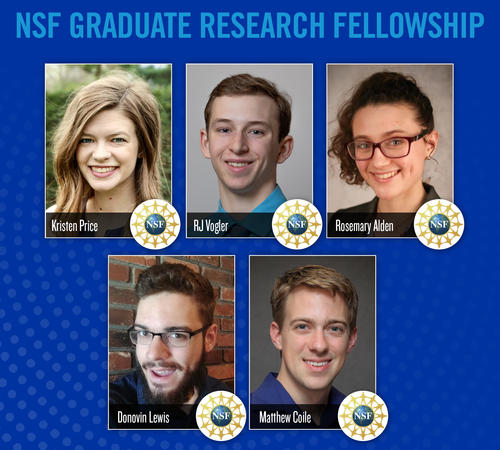The University of Kentucky Office of Nationally Competitive Awards has announced that 10 students and recent graduates have been selected to receive government-funded National Science Foundation (NSF) Graduate Research Fellowships. Five of the 10 are from the College of Engineering.
As part of the five-year fellowship, NSF Fellows receive a three-year annual stipend of $34,000 along with a $12,000 cost of education allowance for tuition and fees for a research-based master's or doctoral degree in a STEM (science, technology, engineering or mathematics) field.
The five students and recent graduates from the College of Engineering are:
- Rosemary Alden, a graduating electrical engineering senior from Nicholasville, Kentucky, who will pursue research in electrical and electronic engineering and her doctorate at UK;
- Matthew West Coile, a 2019 chemical engineering and Lewis Honors College graduate from Gaithersburg, Maryland, who will pursue research in chemical engineering at Northwestern University;
- Donovin Denis Lewis, a graduating electrical engineering senior from Paducah, Kentucky, who will pursue research in electrical and electronic engineering and his doctorate at UK;
- Kristen Juranda Price, a 2019 mechanical engineering graduate from St. Charles, Missouri, who will pursue research in mechanical engineering and her doctorate at UK; and
- Ronald Justin Vogler, a graduating chemical engineering and Lewis Honors College senior from Mason, Ohio, who will pursue research in chemical engineering at the University of Texas at Austin.
Mariah Bezold, a 2020 chemical engineering and Lewis Honors College graduate from California, Kentucky, who is currently working on a doctorate in biomedical engineering at Vanderbilt University, received honorable mention recognition from the NSF Graduate Research Fellowship Program.
The NSF GRFP is the country’s oldest graduate fellowship program directly supporting graduate students since 1952. GRFP is a critical program in NSF's overall strategy to develop a globally engaged workforce necessary to ensure the nation's leadership in advancing science and engineering research and innovation. A hallmark of GRFP is its contribution to increasing the diversity of the STEM workforce, including geographic distribution, as well as the participation of women, underrepresented populations, persons with disabilities and veterans.
